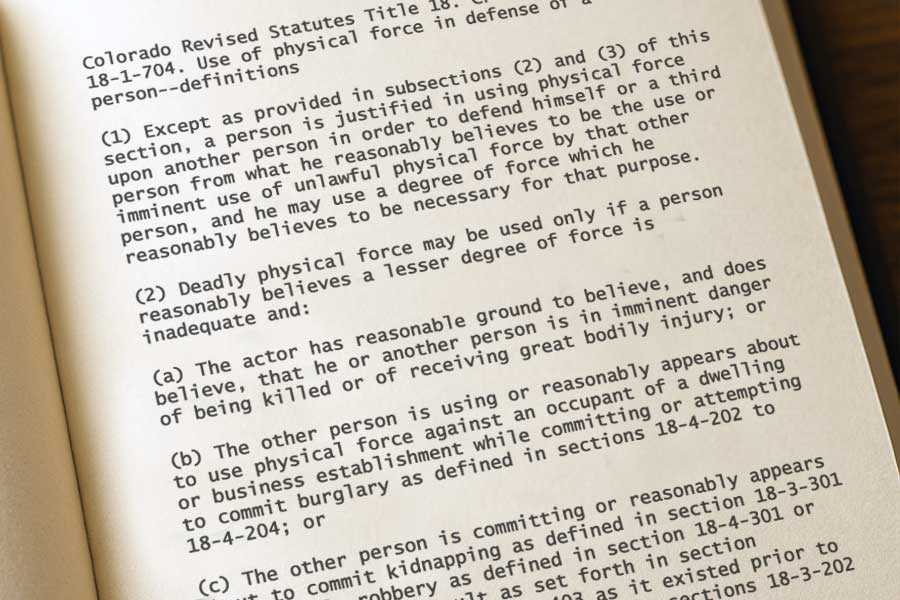It’s a scenario many never expect: you defend yourself during a heated domestic argument—and end up the one in handcuffs. In Colorado, self-defense is legal, but it’s not a free pass. If you cross certain lines, what began as self-protection can be charged as assault or domestic violence.
So how does the law draw the line between defending yourself and committing a crime?
Colorado’s Self-Defense Law
Colorado recognizes the right to self-defense under CRS § 18-1-704, which permits the use of physical force if:
- You reasonably believe it’s necessary
- To protect yourself or another person
- From what you reasonably perceive as the use or imminent use of unlawful force
However, you can’t use deadly force unless you reasonably believe you’re facing death or serious bodily harm.
Why People Still Get Arrested
Even when self-defense is valid, it’s still subject to judgment by:
- Law enforcement on the scene
- The district attorney deciding whether to press charges
- The judge or jury interpreting what was reasonable
Common reasons self-defenders still face arrest:
- Both parties are injured, and it’s unclear who started it – When officers arrive and both individuals have visible injuries, they may arrest both or the person perceived as more aggressive, even if that person was defending themselves.
- The force used was disproportionate – For example, using physical violence in response to verbal abuse or pushing someone who posed no physical threat can tip the scale toward criminal charges.
- The accused has a prior criminal or protection order history – A history of prior incidents, even if unrelated, can influence how police and prosecutors view the situation.
- The initial aggressor later claims to be the victim – It’s not uncommon for the person who instigated the conflict to make the first call to 911, setting the narrative before law enforcement arrives.
Domestic Violence Makes It More Complicated
In Colorado, domestic violence is not a standalone charge—it’s a sentencing enhancement applied to underlying crimes like assault or harassment, per CRS § 18-6-800.3.
That means if you’re accused of hitting, shoving, or even threatening your partner—and domestic violence is alleged—your self-defense claim must be airtight.
Courts are particularly cautious in domestic scenarios where:
- Both partners accuse each other of violence
- Children were present
- Alcohol or emotional escalation was involved
What Evidence Helps Your Self-Defense Claim?
If you were wrongly charged, it’s essential to preserve:
- Photos of injuries you sustained – Take time-stamped photos of bruises, scratches, or other marks that show you were the one attacked.
- Witness statements from neighbors, friends, or children – Anyone who heard or saw the altercation may be key in corroborating your side of the story.
- Text messages or voicemails showing threats or admissions – Digital communications can reveal who was escalating the situation, or show prior threats or intimidation.
- Medical reports or police bodycam footage – Professional documentation of injuries or recorded interactions with law enforcement can often provide unbiased evidence of what actually occurred.
- Prior threats, patterns, or documentation – If this isn’t the first time you’ve had to defend yourself, prior police reports, messages, or restraining orders can add context and credibility.
Can You Still Face a Protection Order?
Yes. Even if you acted in self-defense, Colorado courts issue mandatory protection orders in most domestic violence cases. These can:
- Ban you from your home
- Prevent contact with your children or partner
- Affect your custody rights
These orders often go into effect immediately after arrest, regardless of guilt or intent.
How Boal Law Defends Self-Defense Cases
We’ve seen both sides—people protecting themselves, and people accused of using it as a cover for violence. At Boal Law, we:
- Investigate quickly and thoroughly – We work to preserve physical evidence, interview witnesses, and obtain any available surveillance or police footage before it’s lost.
- Challenge weak or one-sided narratives – We expose inconsistencies in the accuser’s story, highlight exculpatory evidence, and bring the full context of the relationship into focus.
- Work to lift protection orders – We file motions to modify or remove protection orders when appropriate, especially when they’re based on false or exaggerated claims.
- Defend on both fronts – With experience in both criminal and family law, we craft unified strategies that protect you in court and at home, especially when custody or divorce is involved.
When the Right Thing Becomes a Legal Risk
Self-defense is your right, but proving it is your burden. Especially in domestic cases, the lines between victim and aggressor often blur.
If you’ve been charged after protecting yourself—or worry you might be—Boal Law can help you fight back legally, while keeping your reputation and rights intact.

